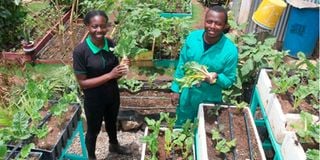Duo changing urban farming practices, one garden a time

Joash Njani and Pramila Mwibanda at their Urban Smart Gardeners business premises in Juja, Kiambu County.
What you need to know:
- Joash Njani, 26, and Pramila Mwibanda, 25, run Urban Smart Gardeners in Juja, Kiambu County.
- Their business involves making mini-gardens for town dwellers as well as offer agronomy services.
In Juja, a commercial and residential hub on the outskirts of Nairobi, urban farming is taking root. A good number of residents live in their own homes and compounds making it possible to engage in small-scale farming.
Joash Njani, 26, and Pramila Mwibanda, 25, have set their sights on Juja to grow their agribusiness.
The two run Urban Smart Gardeners, a business located in the cosmopolitan area through which they offer urban dwellers farming services.
The duo, who are horticulture graduates from the Jomo Kenyatta University of Agriculture and Technology (JKUAT), started by growing various crops and selling to residents.
"Through interaction with our clients, we realised that many were willing to grow their own food but faced some challenges that include limited space, insufficient water and lack of knowledge to manage crops," say Ngani.

Joash Njani and Pramila Mwibanda at their Urban Smart Gardeners business premises in Juja, Kiambu County.
“This made us to start thinking of ways to grow crops in urban areas in a manner that is different. We settled on improvised gardens that are not only efficient, but also easy to manage and beautiful,” adds Pramila.
The journey began towards the end of 2020, with the duo investing Sh200,000 from their own savings and soft loans from family members into the business.
Over a year into the business, the two are happy agripreneurs, operating in Greenfields, Juja, where they run a demo hub on a 50 by 60 feet land that they lease at Sh60,000 per year. The business comprises garden units of various sizes, a seedling propagation unit, an office and ornamental plants.
“We make vertical gardens from various materials that include plastic pipes, metal and wood. We use the latter to make stands for the gardens, while the pipes host the crops and soil," says Pramila.
They formulate the media for growing various crops mainly from soil (20 per cent) and coconut waste (cocopeat, 20 per cent), and the remaining 60 per cent is from various organic compounds, including manure.
“The smallest of our garden, which we call a standard unit, occupies a space of a metre square and hosts 36 plants, which is triple the amount of crops grown on the ground," says Pramila.
The others are economy, which hosts up to 72 plants occupying 2.4 metres square space and premium, which is nine metres squared with a capacity of 240 plants. Their prices range from Sh7,500 to Sh45,000.
A plastic tank sits at the top of the gardens supplying water through the drip system. A unit is designed with a valve, which is opened to allow water flow through the drip lines for about five minutes a day, preferably in the morning.

Joash Njani shows an improvised vertical garden at Urban Smart Gardeners business premises in Juja, Kiambu County.
The duo say they design the gardens themselves, and contract artisans to make some of them.
According to Njani, a variety of seedlings can be planted in the pipes, from spinach to collard greens, traditional vegletables, dhania (coriander), lettuce, thyme, sage, mint and onions.
Most produce from the gardens is harvested after four weeks of transplanting seedlings, but this is also determined by good agricultural practices observed.
Njani adds that the gardens are efficient in terms of water usage, conserving up to 60 per cent of the commodity even as it accommodates more plants.
“The system is easy to manage, since weeds do not have room to grow. The gardens are also portable,” says Pramila.
The duo, who employ three workers, have since they started worked with150 farmers, offering them garden installation as well as supplied them with garden units.
They also offer training and consultancy services on gardening, installing efficient systems, sale of gardening inputs from vegetable seedlings, planting media, fertilisers and pest control products both organic and inorganic.
Nevertheless, it is not an easy ride. They depend on hiring pickups and lorries to deliver their products, what leads to increased expenses, which they have to pass to consumers.
To begin such a business, Njani says one needs a business permit issued by the county government as well as a certification from the Kenya Plant Health Inspectorate Service (Kephis) for sale of seedlings.
John Mutisya, a farm field officer at Biovision Africa Trust, an NGO, says vertical gardens are one of climate smart technologies that should be embraced to address food security in urban and dry areas.
“They are a viable technology to promote agriculture because they need little space and water, are not labour-intensive and one maximises space and output.”





